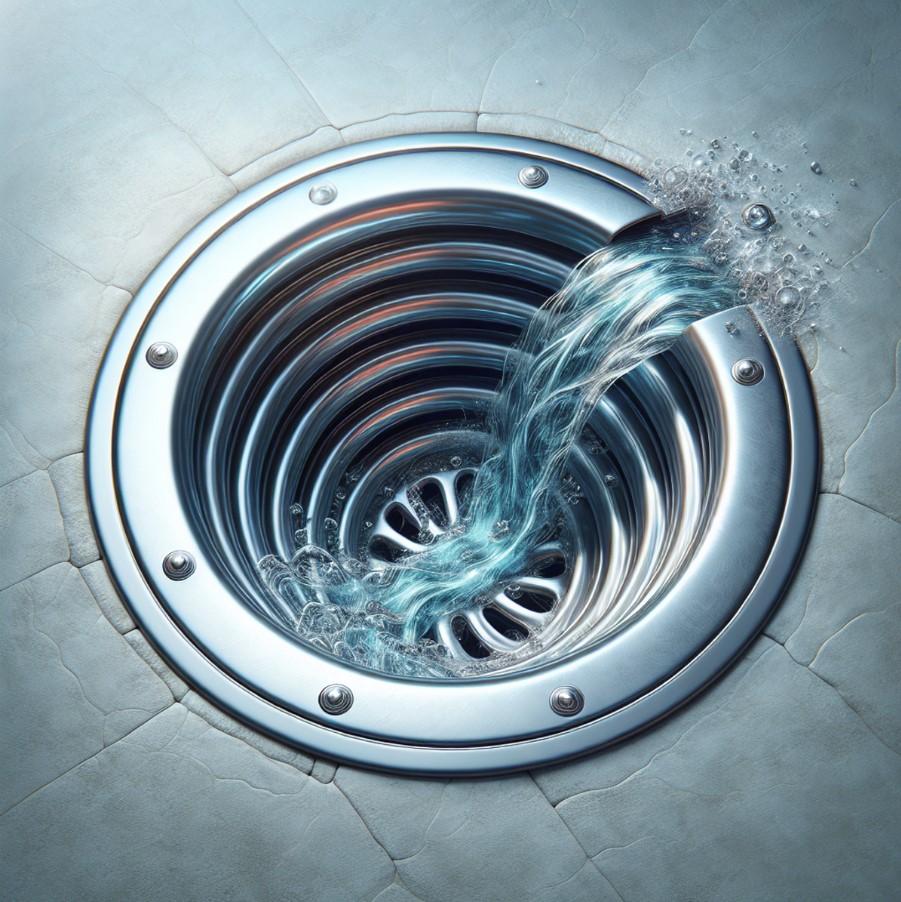
A clogged drain is a common household issue that can cause significant inconvenience and even costly damage if left unaddressed. It occurs when substances—be it hair, grease, or foreign objects—accumulate in the plumbing system, obstructing the free flow of water. The importance of preventing clogged drains cannot be overstated. When drains become blocked, they not only disrupt the normal functioning of the home but can also inflict serious damage to the plumbing system over time.
This guide is curated with expertise culled from over 40 years of experience serving Oceanside community as a leading provider of reliable plumbing services. It aims to provide an in-depth understanding of drain clogs, their causes, and most importantly, measures to prevent them.
In this all-inclusive guide, we will delve into:
- Understanding what causes drain clogs
- The significance of regular drain maintenance
- Specific preventive measures for kitchen and bathroom drains
- Other areas to watch out for such as outdoor drains
- Do’s and Don’ts when using a garbage disposal unit
By implementing these tips and making them part of your regular household maintenance, you can effectively prevent drain clogs and secure long-term peace of mind. If you ever need professional assistance with commercial plumbing services, do remember we are just a click away.
1. Understanding Drain Clogs
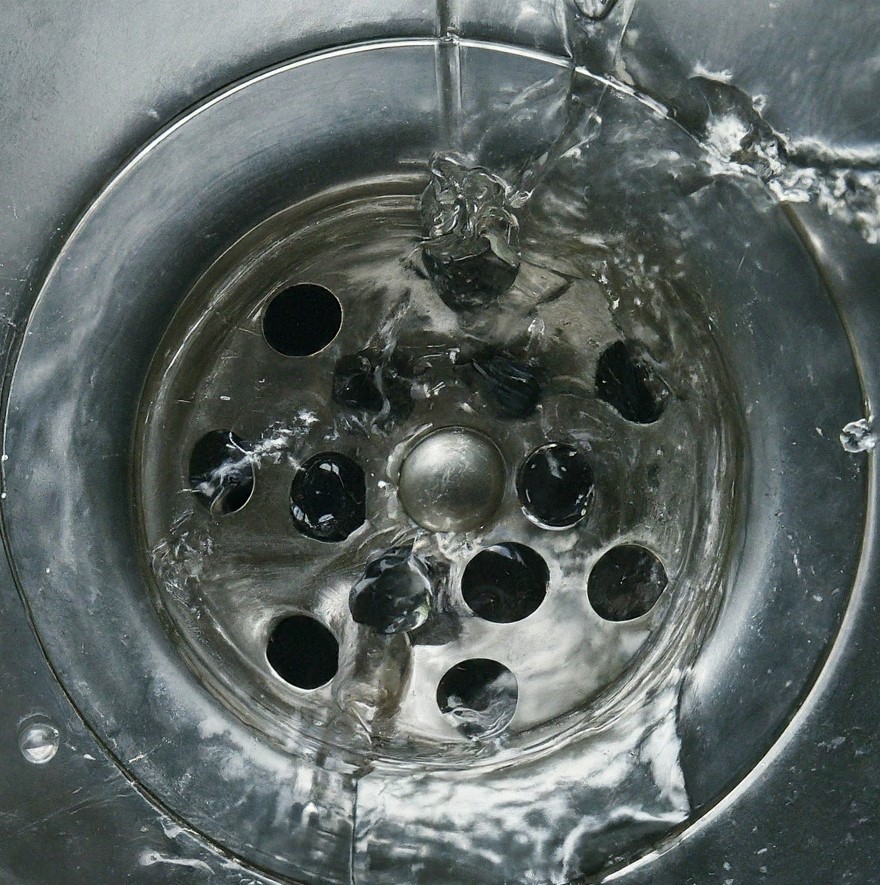
Drain clogs are blockages that occur within the plumbing system, often resulting in reduced drainage speed, backflow, and even complete stoppage of water flow. These clogs can disrupt the smooth functioning of a home’s plumbing infrastructure and lead to significant inconvenience.
Common causes of clogs include:
- Hair Buildup: A common culprit in shower and bathtub drains, hair forms a net-like structure that traps other debris, intensifying the blockage.
- Grease Accumulation: Often originating from kitchen sinks, grease solidifies inside pipes, adhering to the walls and narrowing the passageways.
- Foreign Objects: Items such as wipes, sanitary products, or toys can inadvertently be flushed down toilets or dropped into drains, leading to immediate obstruction.
To maintain a functioning plumbing system and avoid such issues, residents of Oceanside can rely on Residential Plumbers Oceanside, the trusted name for residential plumber services with over 40 years of experience in addressing complex drain clogs.
For homeowners looking to prevent such plumbing disturbances themselves, it is crucial to understand these primary factors contributing to drain blockages. Gaining this knowledge helps in taking proactive steps towards maintaining clear pipes and avoiding the need for emergency interventions. For those interested in broadening their understanding of preventive practices and minimizing risks associated with DIY approaches, exploring safer alternatives through expert guidance is highly recommended. Insightful tips can be found at Avoid Plumbing Disasters with These Expert Tips provided by Plumbers Oceanside.
2. Importance of Regular Drain Maintenance
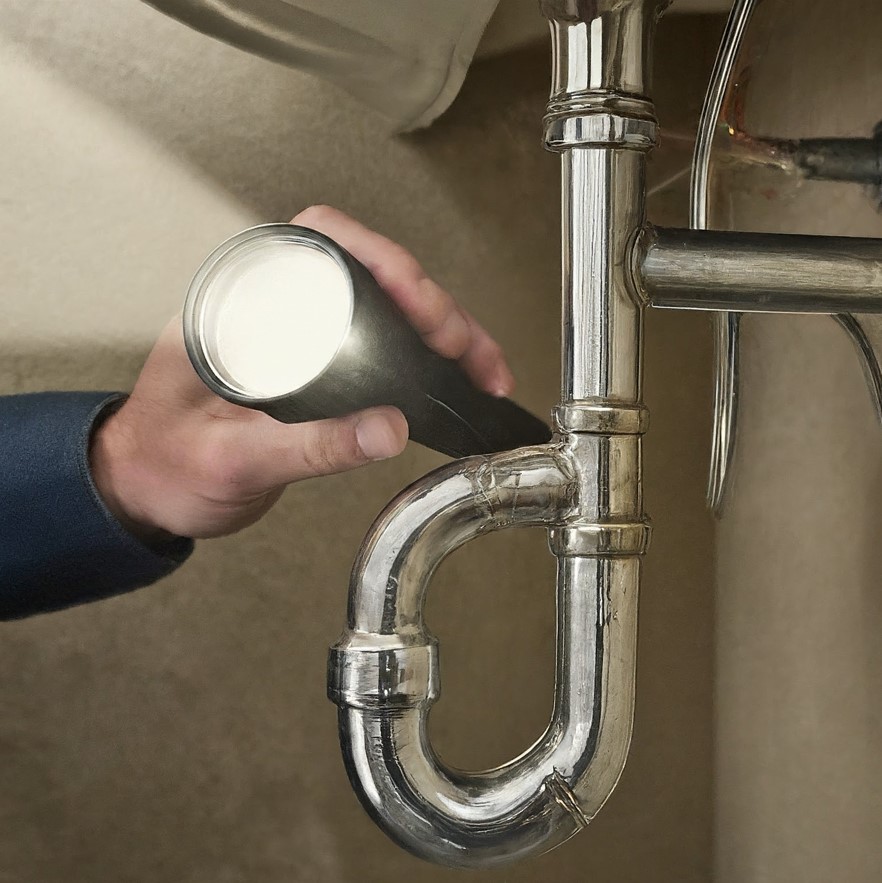
Regularly maintaining your home’s plumbing system is crucial for keeping your drains working well and avoiding clogs. Many people don’t think about this until they actually have a clog, but taking preventive actions can make a big difference.
There are two main approaches to drain maintenance: doing it yourself (DIY) or hiring professionals. Both are important in their own ways when it comes to keeping your drains healthy.
DIY Solutions
These are things you can do on your own to prevent clogs:
- Regular cleaning: Make it a habit to clean your drains regularly using simple methods like pouring boiling water or a mixture of vinegar and baking soda down the drain.
- Avoiding flushing non-degradable items: Be mindful of what you flush down the toilet or wash down the sink. Items like wipes, cotton balls, or grease should never be flushed as they can easily cause blockages.
- Using drain covers: Install drain covers in your sinks and showers to catch hair, soap scum, or food particles before they go down the drain.
These DIY practices are effective for day-to-day maintenance, but they may not be enough to tackle stubborn clogs that develop deep within your pipes over time.
Professional Plumber Services
This is where hiring a professional plumber becomes necessary. Certified plumbers, like our experienced team at Plumbersoceanside.com, have the knowledge and tools to perform thorough inspections and cleanings. They can:
- Use specialized equipment such as drain snakes or hydro-jetting machines to remove tough blockages.
- Conduct video camera inspections to identify hidden issues within your pipes.
- Offer expert advice on potential plumbing problems and suggest appropriate solutions.
By combining both DIY solutions and professional services, you can ensure that your drains receive comprehensive care:
Regular drain maintenance is essential for keeping your plumbing system in top shape. While simple tasks like cleaning or using drain covers can prevent minor clogs, it’s equally important to have a professional plumber inspect and clean your drains periodically. This way, any potential problems can be addressed before they turn into major issues.
In the next sections, we will discuss specific preventive measures for different areas of your home, starting with kitchen drain maintenance.
3. Essential Tips for Kitchen Drain Maintenance
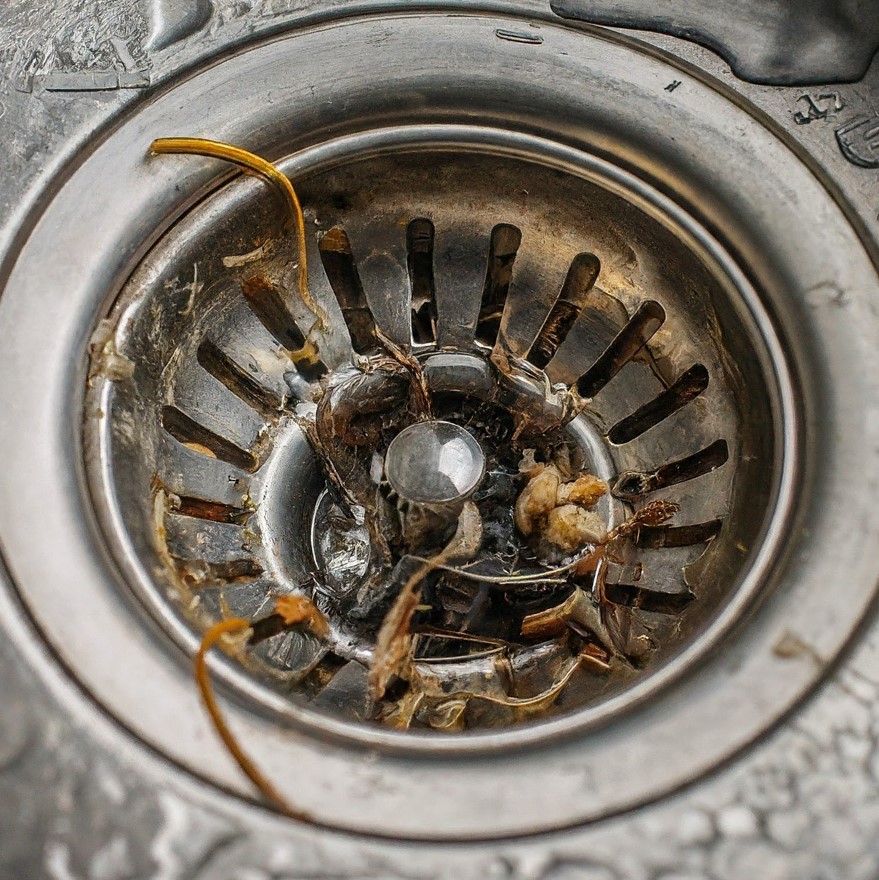
The kitchen sink is the centerpiece of kitchen cleanliness and functionality, but without proper care, it can become a source of frustration due to clogged drains. Preventive maintenance is key in ensuring a seamless flow and avoiding backups. Here are specific measures to safeguard your kitchen drains:
1. Utilize a Mesh Strainer
- Place a mesh strainer over the drain to trap food particles.
- Ensure it fits well to cover the entire opening.
- Clean the strainer regularly to prevent buildup.
2. Proper Usage of Garbage Disposal
- Run cold water before, during, and after disposal use to solidify grease and oil.
- Feed waste gradually to avoid overwhelming the system.
- Avoid disposing of expandable foods like pasta and rice that can swell inside pipes.
3. Routine Flushing with Hot Water
- Pour boiling water down the drain weekly to dissolve grease and soap scum.
- This simple action can prevent the accumulation that often leads to clogs.
4. Natural Cleaning Solutions
- Use a mixture of vinegar and baking soda monthly as a non-corrosive cleaner for your drains.
- Allow the solution to work for an hour before rinsing with hot water.
Adopting these strategies can significantly reduce the likelihood of clogged kitchen drains. By incorporating these practices into your regular kitchen routine, you ensure that your sinks remain in top condition, preventing potential disruptions in your daily activities.
4. Bathroom Drain Care: How to Avoid Costly Blockages
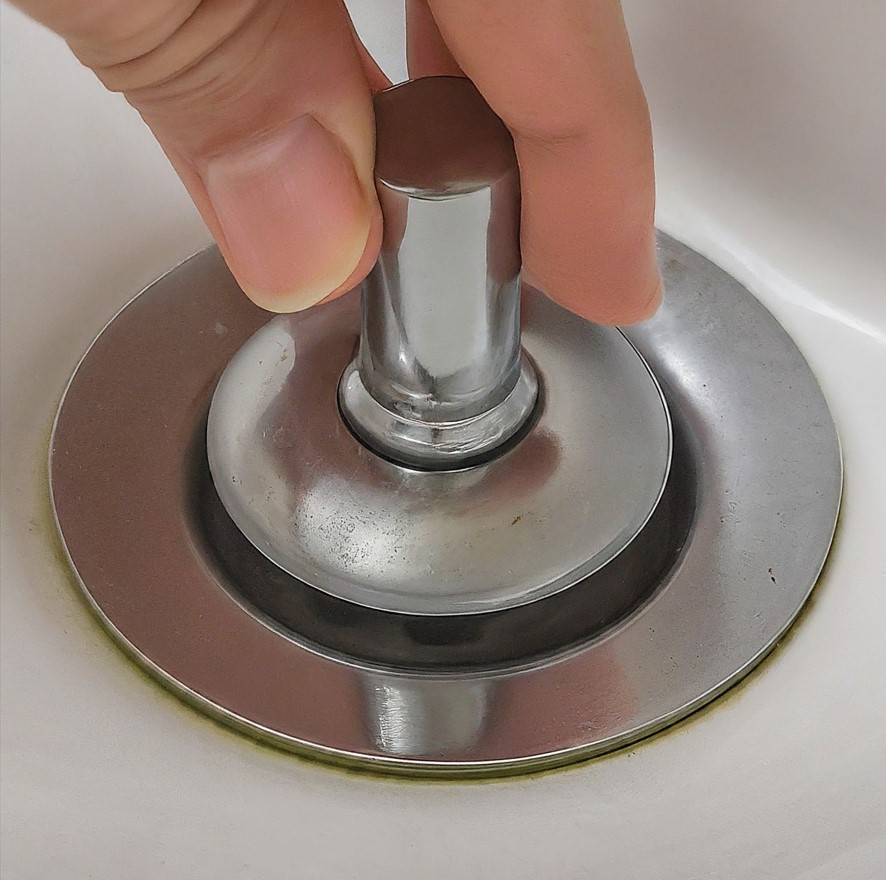
Shower Drain and Hair Clogs
The bathroom is a hotspot for potential drain blockages, largely due to hair that accumulates during showers. Implementing the use of a hair catcher can significantly reduce this common source of clogs. A simple mesh screen placed over the shower drain traps hair strands before they enter the plumbing system.
- Install a hair catcher: Choose a model suitable for your shower drain to effectively capture hair without obstructing water flow.
- Regular cleaning: Ensure the hair catcher is cleaned after each shower to prevent buildup and maintain its efficacy.
Bathroom Sink Maintenance
Beyond the shower, the bathroom sink often faces clogs from soap scum, toothpaste residue, and other debris. Regular cleaning of the sink drain is essential to avoid these types of blockages.
- Cleaning drain stoppers: Remove and clean sink stoppers frequently to clear out accumulated gunk.
- Hot water flushes: Periodically run hot water through the sink to dissolve soap scum and oily residues.
These preventative measures, tailored specifically for bathroom plumbing challenges, contribute to maintaining a clear and fully functional drainage system. By incorporating these strategies into routine bathroom maintenance, homeowners can significantly reduce the likelihood of facing disruptive and costly drainage issues.
5. Other Areas to Watch Out for: Outdoor Drains and More
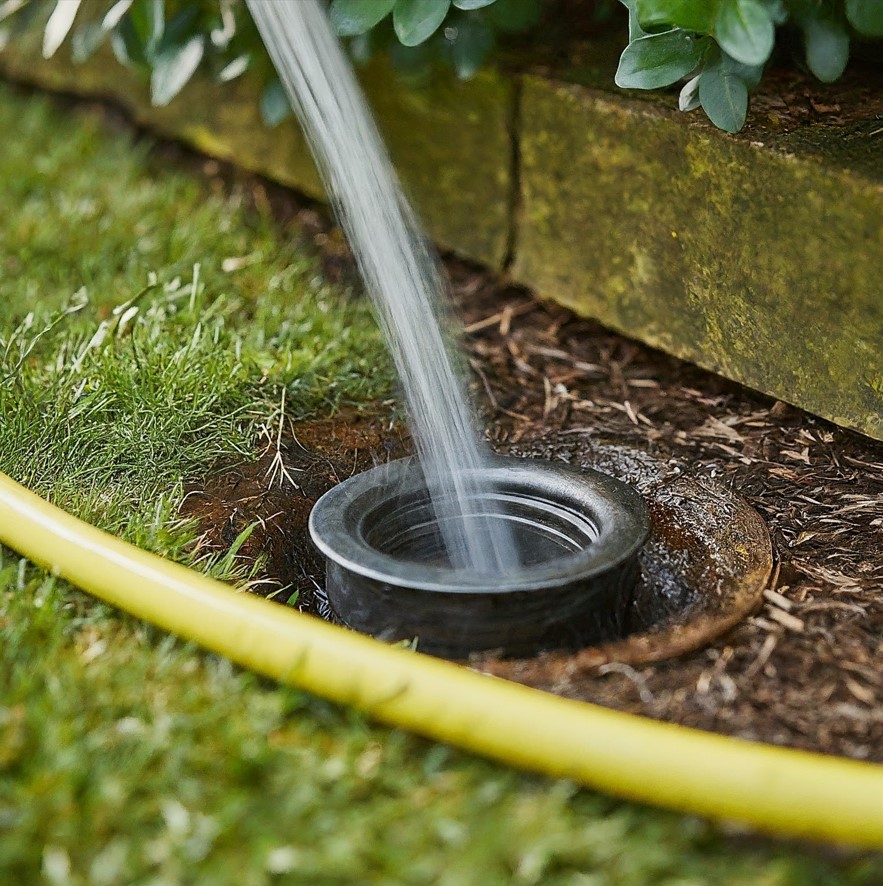
Outdoor drains, just like indoor drains, need regular maintenance to prevent clogs and keep them working properly. There are a few common issues with outdoor drains that you should be aware of:
Dealing with Leaves
- One of the main problems with outdoor drains is leaves and other natural debris getting into them. Here are some simple steps you can take to prevent leaves from clogging your drains:
- Regularly sweep or rake your yard to keep it clear of fallen leaves.
- Consider installing leaf guards or grates over your drains to catch larger debris.
- Schedule routine professional cleaning to ensure any deeply lodged debris is removed.
Maintaining French Drains
- Another area that homeowners often forget about is French drains. These drains are designed to redirect water away from your home, which helps prevent water damage. However, they also need regular upkeep to stay effective. Here’s a quick guide to maintaining French drains:
- Check the drain for any buildup of dirt or other materials that could block the flow of water.
- Use a high-pressure hose to clear out any accumulated debris inside the pipe.
- Regularly inspect the drain outlet to make sure it’s not blocked by anything.
- It’s important to remember that taking care of your outdoor drains is just as crucial as maintaining your indoor plumbing fixtures. By following these tips, you can ensure that your property has a well-functioning drainage system.
6. The Do’s and Don’ts of Garbage Disposal Use
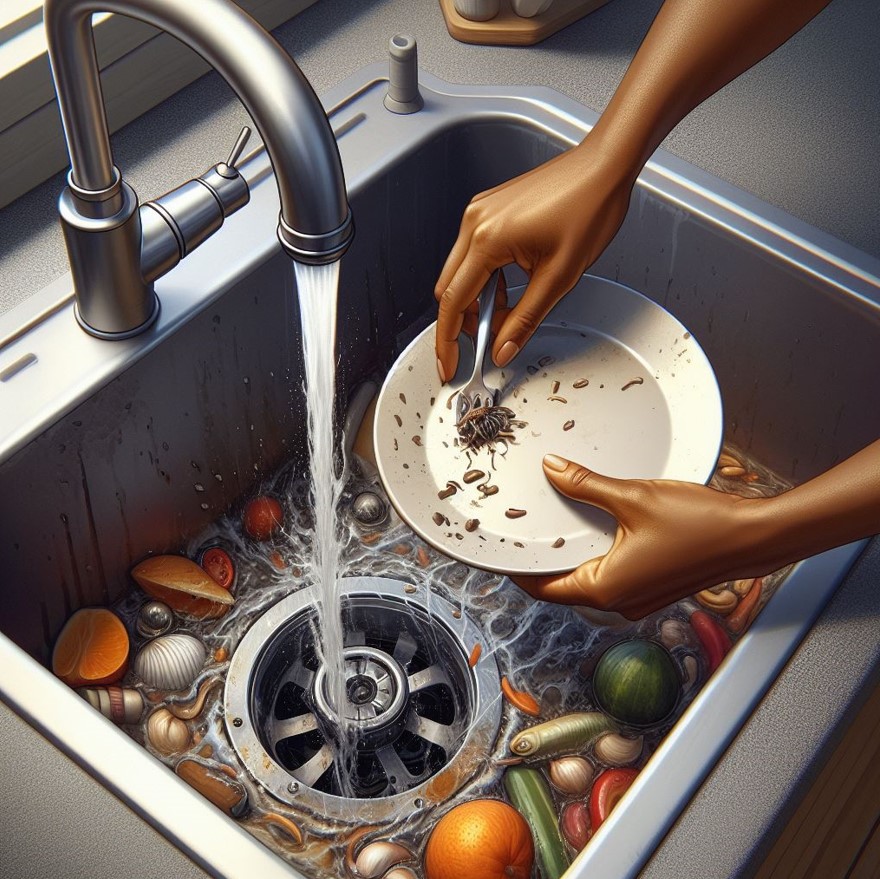
Garbage disposals are handy tools in the kitchen, quickly getting rid of food waste. But not all foods can be thrown into them. Knowing how to use them correctly is crucial for avoiding clogged drains.
1. Avoid Putting Hard Items Down the Disposal
One common mistake is thinking that eggshells can go down the garbage disposal. In reality, they harm the blades and can mix with other debris, leading to troublesome clogs.
2. Be Careful with Fibrous Foods
Certain foods like potato skins, celery stalks, or onion peels have stringy fibers that can wrap around the garbage disposal blades. This not only blunts the blades but also causes blockages over time.
3. Follow These Best Practices for Using a Garbage Disposal
Practicing proper garbage disposal use can make a huge difference in maintaining clear drains. Here are some essential tips:
- Run cold water before, during, and after operating the garbage disposal. Cold water helps solidify any grease or oil that might be present so it can be chopped up by the disposal.
- Feed waste slowly into the disposal. Overloading can cause jams.
- Clean your garbage disposal regularly. A simple method is to run it with a few ice cubes and a small amount of dish soap. The ice helps clean off any residual food on the blades while the soap deodorizes.
By being mindful of what you put down your garbage disposal and understanding its proper operation, you can prevent unwanted clogs and extend its lifespan.
Conclusion
Drain maintenance is not a luxury, but a necessity. This guide has provided several methods for preventing clogged drains that you can easily incorporate into your daily routine. By following these practices, you can avoid the frustration and cost of dealing with stubborn clogs and extend the life of your plumbing system.
Remember, it’s always better to prevent clogs than to deal with them later. Regular drain maintenance offers many advantages in the long run, including:
- A plumbing system that works properly and doesn’t cause any inconvenience
- Lower risk of water damage to your home’s structure
- Saving money by avoiding expensive repairs or replacements
When you make these strategies part of your regular household activities, you’re taking care of your plumbing system’s health and performance.
Plumbersoceanside.com, with our 40 years of field experience and dedicated team of certified plumbers, is always here to assist you with your plumbing needs. However, we believe that the first line of defense against clogged drains lies in every homeowner’s hands.
Remember: A small step today can save you from a big problem tomorrow. Start implementing these preventive measures now for long-term peace of mind.
FAQs (Frequently Asked Questions)
What are clogged drains and why is it important to prevent them?
Clogged drains occur when debris, grease, hair, or foreign objects block the flow of water through the plumbing system. It is important to prevent them because clogs can lead to water backup, slow drainage, foul odors, and even damage to the plumbing infrastructure of a home.
What are the primary causes of drain clogs?
The primary causes of drain clogs include the accumulation of hair, grease, soap scum, food particles, and foreign objects being flushed down the drain. These substances can build up over time and obstruct the flow of water through the pipes.
Why is ongoing maintenance crucial for keeping drains clear and free-flowing?
Ongoing maintenance is crucial for keeping drains clear and free-flowing because it helps prevent the buildup of substances that can lead to clogs. Regular maintenance reduces the risk of blockages and ensures optimal drain function.
What are some essential tips for kitchen drain maintenance?
Essential tips for kitchen drain maintenance include using a mesh strainer to catch food particles, avoiding pouring grease down the sink, and properly disposing of food waste with a garbage disposal unit.
How can costly blockages in bathroom drains be avoided?
Costly blockages in bathroom drains can be avoided by installing a hair catcher in the shower, cleaning out the sink drain regularly to remove soap scum and debris, and using a drain stopper to prevent foreign objects from going down the drain.
What are some tips for maintaining outdoor drains?
Tips for maintaining outdoor drains include preventing leaves from clogging them, ensuring proper functioning of French drains, and clearing out any debris that may obstruct the flow of water.
What are some problematic foods that should never be put down the garbage disposal?
Problematic foods that should never be put down the garbage disposal include hard items like eggshells, fibrous foods like potato skins, and greasy substances that can solidify and cause blockages in the pipes.
Why is it important to implement preventive measures for clogged drain prevention?
It is important to implement preventive measures for clogged drain prevention because doing so can help avoid costly and inconvenient issues in the future. Regular maintenance can lead to long-term benefits by ensuring smooth drainage and preventing damage to the plumbing system.